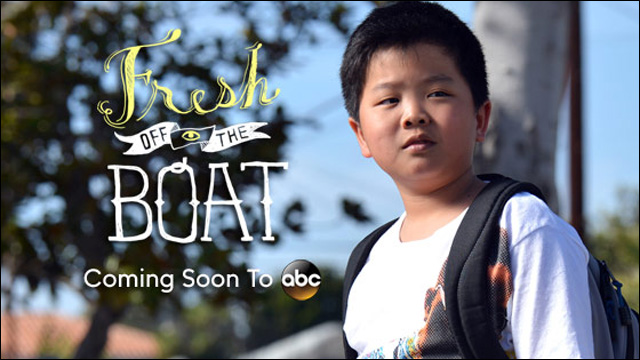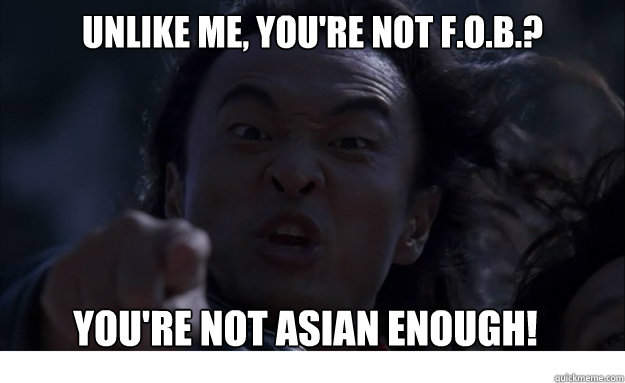The news that ABC has made the bold decision to green-light Fresh Off the Boat, a new Asian American family sitcom airing 20 years after the cancellation of All American Girl, has already been making headlines.
And, if the last 24 hours has been any indication, Fresh Off The Boat is hugely provocative. Already, the show has sparked online controversy, specifically from pop culture critics questioning the possible political insensitivity of the show’s name.
Seriously. How is "Fresh Off the Boat" an OK thing to call a show?????? I am baffled.
— Carrie Raisler (@TVandDinners) May 13, 2014
This reaction is not surprising: it reflects the critics’ recognition of the term as a historic racial slur referencing new immigrants, coupled with ignorance of how “Fresh Off The Boat” (or “FOB”, pronounced “fob”) has also evolved to reference a core cultural dynamic within contemporary Asian Americana. The term “Fresh Off The Boat” is not uniquely Asian American, but it has strong Asian American connotations and distinct cultural significance for members of our community; in the context of this show, it is obvious “insider” language.
This morning, Alex Abad-Santos explored the meaning of the term “Fresh Off the Boat” for Asian Americans in a great article for Vox.com. The article quotes me in writing:
“The show is setting itself up to educate about the term,” Jenn of Reappropriate [said. She] voiced a mild concern with the title, explaining that the term lives somewhere between an insult and self-deprecating humor.
So let’s start that education process here with the question: what does “Fresh Off The Boat” or “FOB” mean?
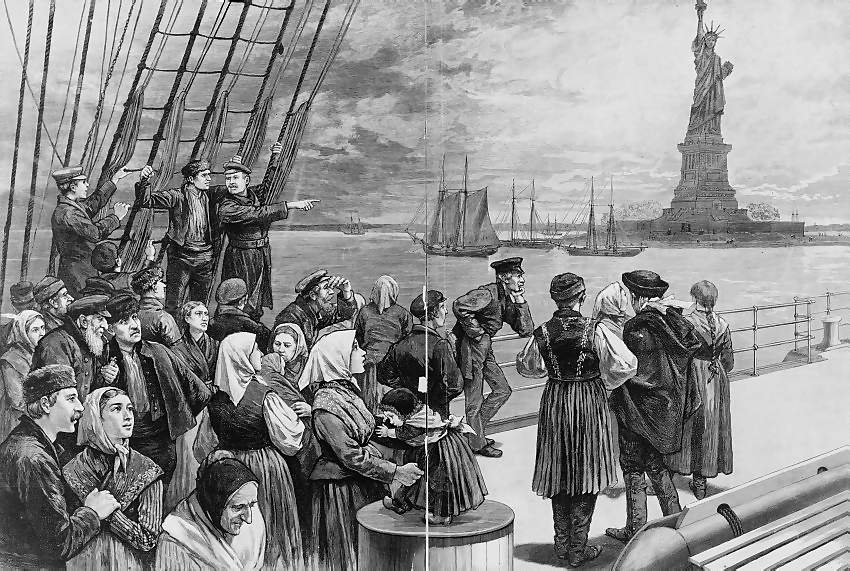
Etymology
“Fresh Off The Boat” is a colloquial turn-of-phrase used in the 19th century in virtually all English-speaking countries, such as the United Kingdom, Australia, New Zealand, the United States and Canada to refer to new immigrants (i.e. people who were literally “fresh off the boat” from their country of origin); this suggests a common root in British English.
In the United States, the phrase was popular in port cities like New York City where it was commonly used, for example, to describe (somewhat pejoratively) newly-arrived Irish American immigrants.
The first published usage of the shorthand “FOB” is cited as occurring in 1968 in an article that appeared in the LA Times, where the writer wrote “[t]he FOBs don’t know English when they get here and their parents move to Chinatown so the family can live with people like themselves.” Here its use is more obviously as a racial slur.
While this 1968 article is clearly not history’s first use of the term “Fresh Off The Boat” — for example, Wikipedia users claim anecdotally that the term was used in New Zealand to refer to recent Pacific Islander immigrants in the 1950’s — it nonetheless illustrates a turning-point in the phrase’s meaning. As a common descriptor for a “foreign” immigrant, “Fresh Off The Boat” was used in the late 19th century and the turn of the 20th century to describe a widespread social phenomenon: the large influx of non-White Irish and Asian immigrants. However, the popularity of the phrase waned in the early decades of the 20th century in America when two things happened: 1) exclusionary immigration laws significantly reduced immigration from Asia, and 2) European American immigrants became increasingly associated with racial Whiteness, mitigating their perceived “foreigness”.
“Fresh Off The Boat” (or its acronym, “F.O.B.”, pronounced “eff-oh-bee”) was repopularized in the late 1960’s following passage of the 1965 Immigration and Naturalization Act that reopened America’s doors to massive immigration, particularly in reference to Asian and Latino Americans. Its resurgence and current popular usage is therefore associated predominantly with the xenophobic fears of non-White immigrants of the late 1960’s.
In short, an honest assessment of “Fresh Off The Boat” requires recognition of its origins as an archaic slur with distinctly racialized overtones.
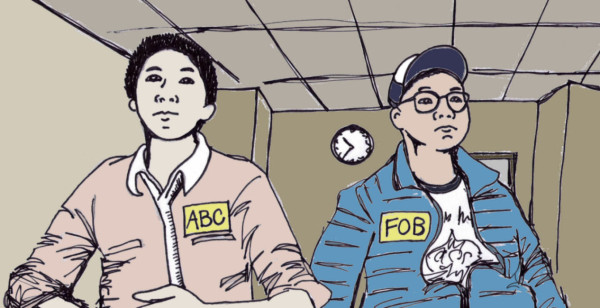
FOB Style
As with many slurs, “F.O.B.” was appropriated by members of the target community — including Asian Americans as well as other immigrant groups — where they took on more nuanced (if often still pejorative) meanings.
(At this point, I just want to briefly note that the term has separate and important connotations in Latino communities, that I won’t be discussing further. But I think it’s important to not erase that history by presuming that “F.O.B.” is uniquely Asian American. It’s not.)
In the Asian American community, the term “F.O.B.” was “widely used in Asian diasporas through the late 1960’s-80’s, especially in the context of post-1965 Asian migration, to differentiate new arrivals from those who have learned requisite cultural and linguistic codes.” (Shankar, 2008).
Sociologists and linguists note that by the 1980’s-90’s, the “F.O.B.” slur had again evolved in Asian American youth culture, and had expanded to reference not just a single person and their time of arrival in the U.S., but an entire sub-cultural style: “FOB-iness” (Shankar coins the term “FOB style”). It is at this point that the word “FOB” (prounced “fob”) became popularized as a form of “insider” language in the Asian American community with a meaning somewhat distinct from its mainstream usage. In discussing the “FOB style” of West Coast South Asian youths, Shankar writes:
I contrast two distinct Desi teen high school styles that embody these differences: the mainstream style of teens referred to as “popular”; and a marginalized style called “FOB,” or “Fresh off the Boat.” I focus primarily on FOB styles to examine how FOBs are judged by Desi peers as nonnormative, how they vary according to gender, and the ways they are received at school.
…In the Desi context, FOB attributes include not adequately following fashion trends, having oily hair, speaking Punjabi at school, and speaking Desi Accented English (which I explain in detail below). Notably, these codes do not involve distancing oneself from everything South Asian.
Shankar notes that in contrast to “Fresh Off The Boat” or “F.O.B.”, “FOB” in this context has less to do with a person’s time of arrival in America than with the degree to which a person expresses “FOB-by” traits; a second- or third-generation South Asian youth might still be cast as a “FOB” based on his or her personal style.
Growing up in the same era in Toronto, Canada in a predominantly Chinese Canadian population, a similar dynamic could be observed between Chinese North American “FOBs” and self-described “CBCs” (Canadian-Born Chinese) or “CBAs” (Canadian-Born Asians), with similar commonly-understood stylistic signifiers that might be used to mark a person “CBC” or “FOB”. (In America, it is “ABC” or “ABA”, respectively).
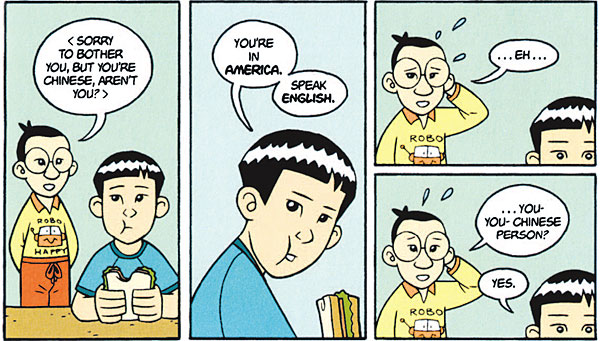
“ABA” vs “FOB”
For Asian Americans like myself, the dynamic between acculturated “ABAs” and “FOBs” is quintessentially Asian American; indeed, Shankar discusses how the ABA/FOB dynamic influences concepts of racial identity and authenticity for many South Asian youths in his study. In fact, this conflict is so fundamentally Asian American, it was the subject of David Henry Hwang’s play “FOB”, which premiered in 1980.
Whereas “FOB” is entirely derogatory in mainstream culture, in the Asian American community, the term’s meaning is more nuanced and complex. Talmy et al (as quoted here) notes that in one ESL class, recent immigrants took efforts to distance themselves from being labelled as a “FOB”, viewing the term as “a noxious label signifying a recently-arrived, monumentally uncool, non-English-speaking rube of mythical, and for some, hilarious proportions.”
However, since the 1980’s, Asian Americans have also questioned the fundamental assumptions of “FOB” as implicitly pejorative by challenging how it assumes something positive about cultural and linguistic assimilation with America. Instead, “FOBs” might also be viewed as more in touch with their Asian heritage and language, more capable of code-switching, more culturally radical, less culturally White-washed. Why should there be something wrong with being a “FOB”, they ask?
Today, the term “FOB” is still largely pejorative, but for some Asian Americans, “FOB” identity has also become a point of pride. A few years ago, two Tumblrs — MyMomIsAFob.com and MyDadIsAFob.com (link broken now) — were launched that served as digital love letters to first-generation Asian American parents, many of whom accidentally or intentionally expressed “FOB-y” traits. Hall-Lew et al. (2014) describe in a recent paper a community of Asian Americans in San Francisco where second- or third-generation Asian American youth are rejecting Americanization to embrace “FOB” clothing and style, which is seen as prestigious by other Asian and non-Asian students.
These efforts to reject cultural assimilation and reclaim the term “Fresh Off The Boat” as a positive identity for immigrants is what is being invoked by Eddie Huang in his memoir and his new ABC sitcom. He tells Buzzfeed:
I would never call myself an American… [With Fresh Off The Boat] I want to represent the Asian-American story, but even more than that, this is a coming-of-age story. I hate when people say ‘finding your place in America’ or ‘fitting in’ — those are assimilation words. This is about creating your place in America. It’s not about fitting into one reference group, because fuck it, I’m going to make you adjust to my life.
Of course, what Huang neglects to address is all the inherent issues that come with the attempt to reclaim any racial slur. Efforts to assert “FOB” pride do not erase the racialized and racist history of “FOB” and its predecessor terms as a word that was used by non-Asians to marginalize Asian immigrants; consequently, even just the conversation about reclaiming the slur is itself complex and sensitive, and will certainly be meaty material for the sitcom. Personally, I don’t buy into the idea of reclaiming racial slurs — I don’t think it’s possible for a slur to escape its derogatory history — but am interested in hearing Eddie Huang’s argument in favour of it via his sitcom.
Either way, wherever you fall in the spectrum between “ABA” and “FOB”, I think we can all agree that the conflict is itself an authentically Asian American trope, one that raises issues that can be uncomfortable, derogatory, and still fundamental to our understanding of what it means to be Asian American.
“Fresh Off The Boat” may be a pejorative term, but, on the other hand: if you were going to write a show about Asian Americans for Asian Americans, that’s what you would call it (and certainly not “Far East Orlando”, a substitute title for the sitcom that was briefly bandied about). The choice to use a self-deprecating and even derogatory term like “FOB” for the title of the show may be worrisome to some (and with good reason), but it also signals an ambitious effort to have an Asian American and immigrant narrative — not a White American one — drive the themes of this sitcom.
And, as Eddie Huang might say, if non-Asians don’t get it? “Fuck it”.
